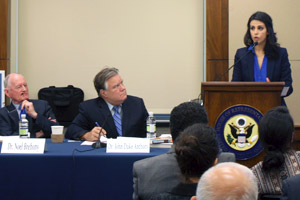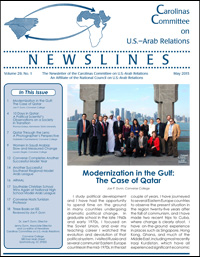NATIONAL COUNCIL ON U.S.-ARAB RELATIONS EARNS CONTRIBUTION FROM ESSAM AND DALAL OBAID FOUNDATION FOR EDUCATIONAL EFFORTS
Washington, DC, USA & Geneva, Switzerland: The Washington, DC-based National Council on U.S.-Arab Relations (National Council) is pleased to announce it has been awarded a grant from the Essam and Dalal Obaid Foundation (EDOF) in support of the Council’s educational programs, projects, events, activities, and publications. EDOF, based in Geneva, Switzerland, seeks to make a difference in improving lives everywhere by fostering peace and dialogue among people. The unrestricted contribution will further the Council’s work to enhance American awareness, knowledge, and understanding of the Arab countries, the Mideast, and the Islamic world.
EDOF CEO Dr. Nawaf Obaid noted that, “We are delighted to support the educational mission of the National Council. The Council’s multifaceted efforts to promote Arab-U.S. relations are vital to building bridges of friendship, collaboration, and understanding.”
The National Council’s vision is a special relationship between the United States and its Arab partners, friends, and allies that rests on as solid and enduring a foundation as possible. The Council’s means for pursuing its vision encompass but are not limited to programs for Arab-U.S. leadership development, people-to-people exchanges, lectures, publications, an annual policymakers conference, and the participation of American students, faculty, armed forces officers, and other private and public sector foreign affairs practitioners in Arab world study experiences. As a public service, the Council also serves as an information clearinghouse and participant in national, state, and local grassroots outreach to media, public policy research institutes, and select community, civic, educational, business, and professional associations.
Dr. John Duke Anthony, Founding President and CEO of the National Council, remarked that, “The Council is proud to count EDOF among its supporters. The Foundation’s contribution will help the Council maintain and expand our U.S.-Arab relations leadership development and bridge-building educational efforts.”
About the Essam and Dalal Obaid Foundation: Founded in 2014 and based in Geneva, Switzerland, the Essam and Dalal Obaid Foundation is a global non-profit organization with a two-fold mission: medical work and social work. In terms of its medical work, the foundation supports medical research and care. In terms of social work, it supports the efforts of state and non-state entities in fostering peace and dialogue among people. More information about EDOF can be found at edof.org.
About the National Council on U.S.-Arab Relations: Founded in 1983 and based in Washington, DC, USA, the Council is an American non-profit, non-governmental, educational organization dedicated to improving American knowledge and understanding of the Arab world, and to helping place and sustain the relationship on the firmest foundation and most mutually beneficial basis possible. Information about the Council’s programs, projects, events, activities, and publications can be found at ncusar.org.




You must be logged in to post a comment.